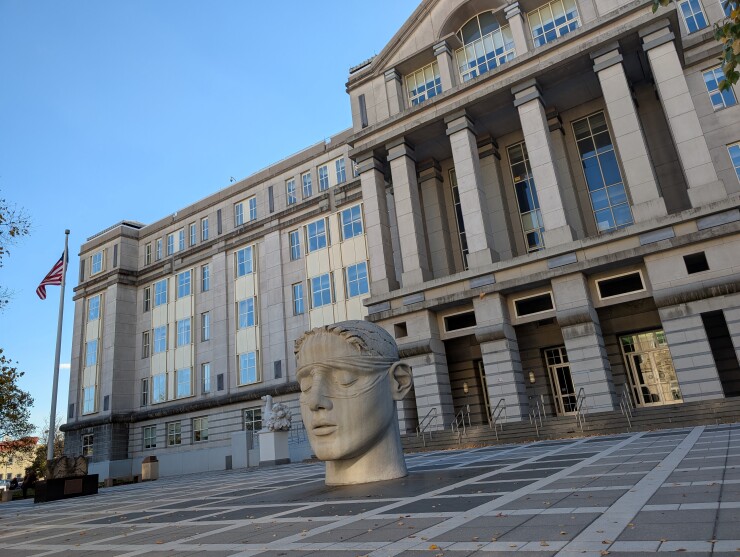Want unlimited access to top ideas and insights?
President-elect Donald Trump has cemented his return to the White House, beating banker predictions of Vice President Kamala Harris emerging victorious and sending stock markets into a frenzy. As President Joe Biden's time in office draws to a close, the banking industry is on the precipice of substantial change.
The morning following Trump's win, major banks such as JPMorgan Chase, Citigroup and Wells Fargo saw significant jumps in their share prices during the day's trading, as campaign claims of fostering a relaxed regulatory environment spurred activity.
"The assumption going forward in terms of what to anticipate from Washington, D.C., includes an extension of the 2017 tax cuts and higher spending — as well as a push to lower corporate tax rates," Ian Lyngen, a rates analyst at BMO Capital Markets, wrote in a note to clients.
Read more:
Further expectations for change extend to the
Experts say a total gutting of the CFPB is an unlikely scenario that would require both an act of Congress and "a filibuster-proof majority in the Senate," which the Trump administration will not have.
Joseph Lynyak, a partner at Dorsey & Whitney, said in an interview with American Banker's
Where the Federal Reserve's Board of Governors is concerned, Trump has a bit more power.
The first slated opening on the board is when current Biden-appointed Gov.
"The financial markets do not want to see a politically driven Federal Reserve in terms of policy," board member Christopher Waller said during a
Read more:
Read on for insights into what predictions analysts speculate could be Trump's impact on the banking industry and what the future regulatory landscape could hold.

Senate Democrats seek out another half-point Fed rate cut
Leading Democratic legislators in the U.S. Senate applauded when the Federal Reserve
Sens. Elizabeth Warren, D-Mass., and John Hickenlooper, D-Colo., wrote in a letter to Federal Reserve Chairman Jerome Powell before last week's FOMC meeting that the first reduction was "a good first step" as economic results show results in stabilizing
"Given the Fed's confidence in inflation moving towards its target of 2%, now is the time to lift its restrictive policies and proceed with additional rate cuts," Warren and Hickenlooper wrote.
Read more:

Crypto advocate voted into Senate seat in California
Rep. Adam Schiff, D-Calif., beat out Republican and former Major League Baseball player Steve Garvey on Nov. 5 to move into the U.S. Senate.
Schiff brings with him more than 20 years in the political realm, including a stint as the chair of the House Intelligence Committee from 2019 to 2023 and the lead impeachment manager in Trump's first impeachment trial. He will replace Laphonza Butler, also a Democrat.
Schiff has backed numerous proposals that stood to have grand impacts on the banking industry, such as legislation to
Read more:

Bank stocks rally in wake of Trump win
The morning after Trump's path back to the White House was confirmed, bank share values soared amid expectations for a more relaxed regulatory environment during his second term.
"In our view, a Trump victory and potential Republican sweep is positive for regulatory risk," Keith Horowitz, a Citigroup analyst who covers the banking industry, wrote in a note to clients.
Citigroup and JPMorgan Chase share prices rose by more than 8% during that day's trading. Capital One Financial's stock price jumped by 14% as analysts' predictions for the success of the bank's deal with
Read more:

TD Bank's plea deal approved by New Jersey judge, with five years of probation
U.S. District Judge Esther Salas accepted the terms of TD Bank Group's plea deal on Nov. 7, signaling the latest update in the institution's saga of money laundering and Bank Secrecy Act violations.
The terms of the deal require the bank to pay a fine of $1.4 billion, forfeit roughly $452 million of property tied to the offenses and retain a compliance monitor not associated with TD for three years, in addition to maintaining honesty with the court.
"This is [a situation] where many of our corporate entities, our banks, will [need] to think about compliance in a different way: Are they playing dumb, or are they playing fair?" Salas said, underscoring that her decision is the largest fine she had ever imposed.
Read more:

Could Trump bring back the big bank M&A appetite?
Following Trump's election victory, banking analysts are hopeful that the relaxed regulatory environment he purports to bring with him will spur merger and acquisition activity.
The first contender is Capital One's proposed $35 billion
Read more:





